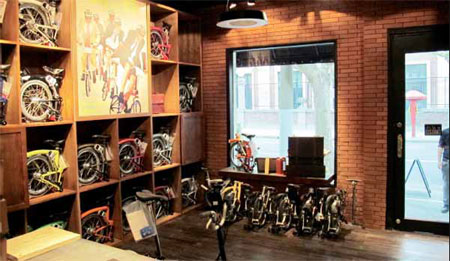Big moves for small peddlers
Updated: 2013-07-26 09:07
By Cecily Liu (China Daily)
|
||||||||
|
Brompton has set up a bike store in Shanghai, and plans to open a second one in another city. Provided to China Daily |
Brompton, Britain's handmade portable bike, unfolds plans for China's commuters
Britain's folding bike, the Brompton, has embarked on a sturdy little trail across China hoping to provide a convenient commuting and recreation option for the country's upwardly mobile urban population.
Since its founding in 1976, Brompton's bikes have become a common sight in cities across Europe and the US as thousands take to two small wheels for short-distance travel to avoid traffic jams and promote fitness.
To share this product with Chinese consumers, Brompton established a store in Shanghai last September, and plans to open a second within the next 12 months in Beijing or Guangzhou.
"If urban dwellers wish to save money on monthly gym fees they can cycle all or most of the way to and from work, school or university," says Quinton Pullinger, Asia-Pacific marketing manager of Brompton.
"City dwellers often worry about their bicycle being stolen, even if locked up. But the Brompton folds up and can be taken with you to the office, coffee shop, restaurant, school, and almost everywhere."
Pullinger says the Brompton's folding element allows it to be easily used in conjunction with public transport such as trains and buses. You simply carry it on and off like a suitcase or parcel.
Brompton bicycles cost from 10,000 yuan ($1,628) to 26,000 yuan in China. That's not cheap, but Pullinger is convinced China's increasingly wealthy middle-class consumers can well afford it.
The fact Brompton hand-makes its bikes in the UK justifies the premium, he says, and he believes the brand's heritage and quality are attractive to Chinese consumers.
The Brompton, finely engineered with a frame mainly made of steel for strength and endurance, is designed to be practical and portable, weighing between 9 and 12 kilos in total.
Following extensive market research in China, Pullinger says he realized that Chinese consumers care very much about quality. They are also increasingly sophisticated and capable of judging the quality of foreign brands, as opposed to taking it for granted.
"Chinese consumers have become more aware of international brands and now take time to understand what a brand is about, what its heritage is," he says.
"Chinese consumers don't just buy a brand anymore simply because it is foreign or perceived as being exclusive. They now look to find something more unique and individual, something that not everyone has, something more exclusive that fits into their particular lifestyle."
Brompton's bikes are made to customers' specifications. They can choose from different colors, handlebars, gears and various other attachments, he says.
Pullinger says Brompton's target consumers are typically between 30 and 45 years old, and mostly male.
He tells of one Brompton customer in China who has a chauffeur driven car. He keeps a Brompton bike in his car and rides to his meetings when the car becomes stuck in traffic.
As well as a commuter tool, the Brompton can also be used for weekends away, says Pullinger. As they fit easily into cars, city folk can take them on holiday, to catch up on exercise or for touring where other vehicles are not practical or unnecessary.
Pullinger's team recently organized a pop-up shop in Beijing to gauge whether the capital was a good location for its next store. They found that Chinese consumers in Shanghai and Beijing are very different.
"Shanghai is more international, and more brands are available to consumers, so it takes more convincing to help the consumers accept Brompton's story is truthful," he says. "In Beijing, people are more open and make decisions more easily."
Pullinger's team has also been promoting the Brompton brand on Chinese social media, including Weibo, the Chinese equivalent of Twitter, Facebook-like Renren, and Youku, the country's answer to YouTube.
Looking to the future, Pullinger says he is optimistic about China's consumer market, believing that Brompton will have room to expand in China's second and third-tier cities over the next 20 years.
As China's urbanization drives up average income levels of consumers, foreign brands continue to covet the Chinese market, but Pullinger advises they take time to study the market, instead of rushing in "for overnight success".
He believes China's consumer market slightly favors smaller brands that also have mainstream appeal, particularly American and European fashion brands.
"Leisure brands or outdoor and sporting goods will see steady increases as consumers become wealthier and have more leisure time," he predicts. "These are still very early days but I believe it is now time to invest and build you brand and business for the long term in China."
Most Viewed
Editor's Picks

|

|

|

|

|

|
Today's Top News
Families of crash victims to sue Asiana in the US
Major SOEs eye profits from abroad
Train collision kills at least 44 in Switzerland
Sino-Japanese summit ruled out
Manila's base plan targets China
Hun Sen's party win to stabilize situation: expert
Beijing plans $81b shantytown renovation project
CMOC buys stake in Rio Tinto
US Weekly

|

|
















